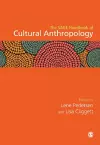
The SAGE Handbook of Cultural Anthropology
2 contributors - Hardback
£155.00
Lene Pedersen is professor and chair of the Department of Anthropology and Museum Studies at Central Washington University. She is a cultural anthropologist with expertise in political, environmental, and visual anthropology. Pedersen, a native of Denmark who grew up in Tanzania, received her BA and Honors Degrees in Anthropology and Foreign Languages from University of Alaska Fairbanks and her PhD in Social Anthropology from University of Southern California. Prior to starting her job at CWU, she held a Post-Doctoral Fellowship at the Australian National University. She has carried out research in Indonesia since 1997, mainly in East Bali, with focus on local governance, resource management, and inter-religious relationships. Her NSF funded project on ‘Integrated Field Research and Spatial Analysis of Multiple Modalities of Political Change’ (BCS-0964432) investigates the changing structures and meanings of ties between political actors in Indonesia’s hybrid system of governance whose newly decentralized political system intersects with older, multi-level traditional systems. Her published work includes the book, Ritual and World Change in a Balinese Princedom, two chapters in edited volumes on ‘Negotiating Religious Identities Within Majority-Minority relationships in Bali and Lombok and ‘Asian Visual and Material Culture in Context.’ She also edited a special issue on ‘Communal Peace and Conflict in Indonesia: Navigating Inter-Religious Boundaries,’ to which she contributed an introduction to ‘Religious Pluralism in Indonesia,’ and she has published articles on ‘State Decentering and Irrigated Rice Production in Bali’ (with Wiwik Dharmiasih),and ‘Responding to Indonesian Decentralization: A Perspective from a Balinese Princedom.’ She is editor and contributor to the film-review column of the General Anthropology Division Bulletin (the American Anthropological Association). Lisa Cliggett is Professor and Chair of Anthropology at the University of Kentucky. Cliggett received her BA in Anthropology from Connecticut College and her MA/PhD from Indiana University. Prior to coming to the University of Kentucky, she held a Mellon Post-Doctoral Fellowship in Population Studies at the University of Pennsylvania. She is a cultural anthropologist with expertise in Economic and Environmental anthropology, as well as migration, development and kinship and has carried out economic and ecological research in Zambia since 1992, working with Gwembe Tonga people who were displaced from the Zambezi river by the building of Kariba Dam in 1958, and their descendants. Cliggett currently heads this longitudinal project (Gwembe Tonga Research Project - GTRP), started by anthropologists Elizabeth Colson and Thayer Scudder in 1956. Cliggett’s recent research concerns the economic, ecological and socio-political dynamics of new road development in the Gwembe Valley (NSF-BCS-1736413). Earlier work examined migration, the politics of land access and land cover change, and livelihood diversification among migrants from the Gwembe Valley, who pioneered areas in conservation buffer zones in Central Zambia (NSF-BCS-0236933; NSF-BCS-0518492). This project included a collaborative study (with D. Crooks) of food security and nutrition in the context of migration (NSF-BCS-0517878). Her other work considers livelihood diversification, household economies, and support systems for the elderly. One outgrowth of the longitudinal research with the GTRP is her work on digital data preservation and access (NSF-BCS-1157418; NSF-BCS-1159109). Her published work includes the monograph “Grains from Grass: Aging, gender and famine in Africa,” “Economies and Cultures” co-authored with Richard Wilk, a co-edited volume (with V. Bond and B. Siamwiza) of Zambian and Zimbabwean scholars’ research: “Tonga Timeline: Appraising 60 years of multidisciplinary research in Zambia and Zimbabwe,” the co-edited (with C. Pool) volume “Economies and the Transformation of Landscape,” and articles and book chapters in disciplinary, topical and area studies journals and volumes.